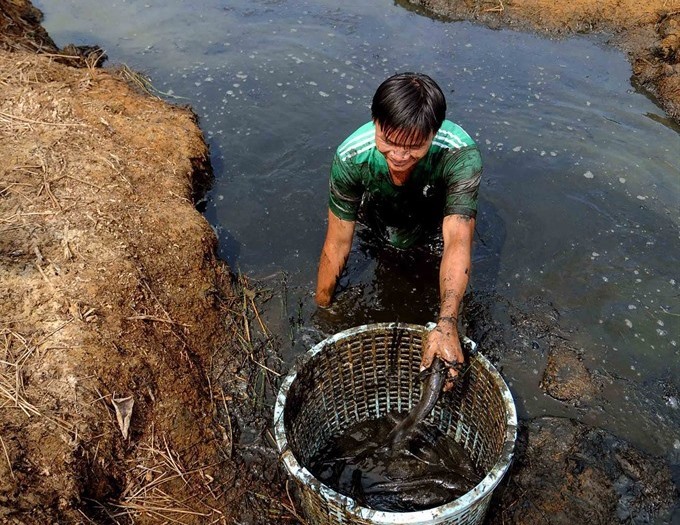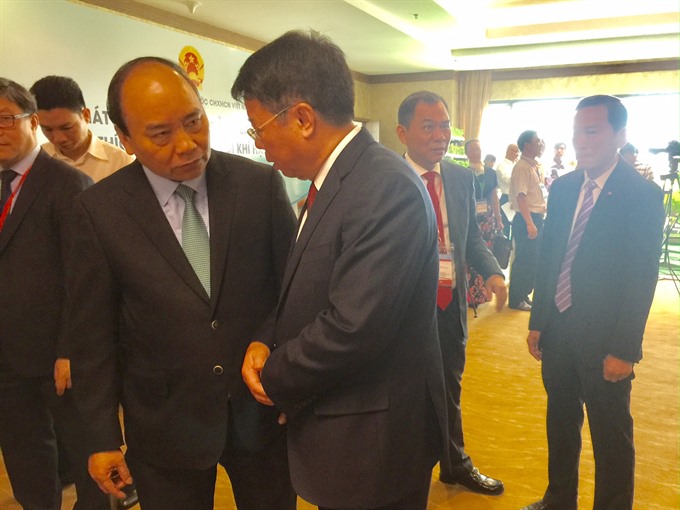 Society
Society

Prime Minister Nguyễn Xuân Phúc has urged provinces and sectors to prioritise and implement serious measures to ensure climate-resilient and sustainable development in the Mekong Delta.
 |
| Prime Minister Nguyễn Xuân Phúc has urged provinces and sectors to prioritise and implement serious measures to ensure climate-resilient and sustainable development in the Mekong Delta. — VNA/VNS Photo |
CẦN THƠ — Prime Minister Nguyễn Xuân Phúc has urged provinces and sectors to prioritise and implement serious measures to ensure climate-resilient and sustainable development in the Mekong Delta.
Speaking at a two-day international conference that ended yesterday in Cần Thơ, Phúc said the Mekong Delta was increasingly being exposed to climate variability events, including drought and saline intrusion.
Severe coastal flooding and riverbank erosion, which have affected the lives of vulnerable communities across the Delta this year, need a coordinated response across all sectors and provinces, according to Phúc.
The PM stressed that the Government was committed to addressing these threats and would spare no efforts to seek transformative sustainable development for the region.
He said the region should shift from a farm and provincial perspective to an inter-provincial, delta-wide and transboundary one, and from a short-term sectoral perspective to a long-term, multisectoral and climate-resilient one.
Better cooperation between provinces, the central government and the private sector would also lead to more efficient and sustainable use of financial and natural resources, he added.
Phúc said that each province must overcome confinement by administrative boundaries and be unified in their approach.
These efforts will require “learning to make natural resources work for rather than against us, adopting a consultative and participatory process, harnessing the knowledge of diverse cultures and experiences of people in the region, and focusing on building their resilience,” he said.
He also called for greater innovation to bring “into full play the potential and competitive advantages of the localities in the region and to engage businesses and the private sector”.
 |
| Prime Minister Nguyễn Xuân Phúc (left) speaks with delegates during a two-day Mekong Delta conference which ended yesterday in Cần Thơ. — VNS Photo Bồ Xuân Hiệp |
Speaking at the conference, Eric Sidgwick, country director of ADB in Việt Nam, said there was broad recognition of the need for an integrated Mekong Delta Master Plan which would include sectoral and spatial aspects and take a long-term, strategic perspective.
Managing water resources is a central theme of the sustainable and climate-resilient plan, which would draw financial resources from the state budget, ODA support and private sources, he added.
“ADB has committed to doubling its climate financing to US$6 billion by 2020. In Việt Nam, improving environmental sustainability and climate-change response is one of the three pillars in the ADB’s Country Partnership Strategy in the 2016-20 period,” he said.
“Through our environment and climate change programmes, we help the Vietnamese Government to address both adaptation and mitigation targets,” he told Việt Nam News.
“In the future, we could support measures to improve irrigation water efficiency in the Mekong Delta. ADB is currently providing innovative solutions to improve the irrigation water-use efficiency in some other climate-vulnerable regions of the country, such as the central coastal and Central Highlands regions,” he said.
“ADB is also working increasingly with the private sector to leverage resources to bridge the financing gap and to incentivise environmentally sustainable growth through public private partnerships,” Sidgwick told Việt Nam News.
Meanwhile, Caitlin Wiesen, UNDP Country Director in Việt Nam, said it was time to rethink development and renew actions to support people’s resiliency to climate change.
The process of identifying challenges, solutions and budgeting as well as investing should start with consultation with all stakeholders, in particular farmers and vulnerable groups, she said.
Consultations can help raise public awareness, which informs decision-making while ensuring that new transformative models are accepted in society, she added.
This consultative process should apply the Vietnamese grassroots democratic principles of “the people know, the people discuss, the people do and the people monitor”, as defined by the Law on Grassroots Democracy, according to Wiesen.
Nienke Trooster, Netherlands ambassador in Việt Nam, said, “I’m convinced that Việt Nam, going through this transformative process, can be an inspiration for other countries faced with similar challenges on how to build a climate-resilient delta where communities can have a sustainable future.”
Speaking on the sidelines of the meeting, Hermen Borst, deputy Delta commissioner of the Netherlands’ Delta Programme, said the focus of the Mekong Delta conference was on large-scale transformations to prepare the region for the future.
Debate among national, provincial and international stakeholders centred on the optimal strategy to provide a sustainable future for the Delta’s more than 17 million inhabitants, he said.
“We have to ask ourselves, when confronting current challenges: Do we want to be remembered by future generations as the ones that caused these problems, or do we want to be remembered as the ones that solved them,” Borst said.
Also speaking at the event, Ousmane Dione, World Bank Country Director in Việt Nam, said the key elements for the transformation to a climate-resilient and sustainable Mekong Delta would require attention to “institutions, information, investments and implementation”.
As one of the most studied delta systems in the world, the region must have a reliable database with effective sharing protocols and harmonisation integrated into the planning process, with focus on interprovincial development, he said.
Dione said the development of the region would require strict adherence to prioritising investments that are efficient and effective; that take into account uncertainties and trade-offs; and that are embedded in science and strong analytics.
In addition, he said the indicator of success in transforming the Mekong Delta development model would come not only from its design but more specifically from actions on the ground with concrete results.
“Preparation is key, but even more critical is taking a pragmatic approach to not let perfection become the enemy of good,” Dione said.
The Mekong Delta is Việt Nam’s most important agricultural region. Producing 55 per cent of the country’s rice, it feeds more than 245 million people worldwide.
The region is also the country’s third largest industrial region after the metropolitan areas of HCM City and Hà Nội.
The conference was organised by Việt Nam’s Government Office and the ministries of Planning and Investment; Natural Resources and Environment; and Agriculture and Rural Development. — VNS